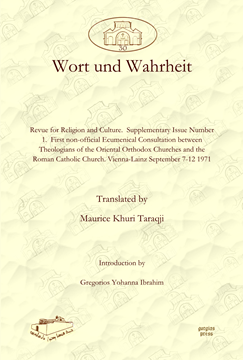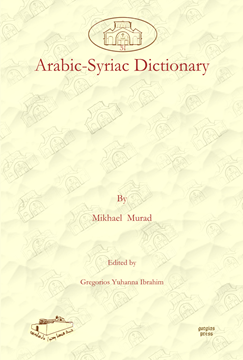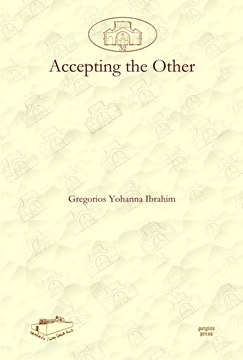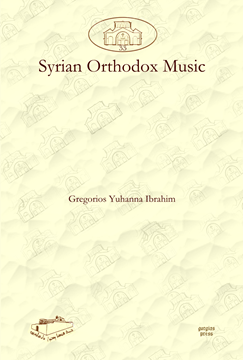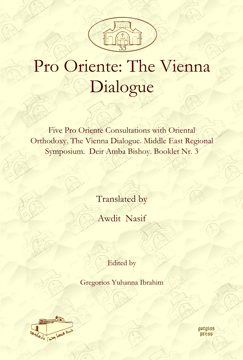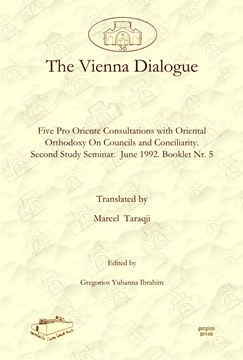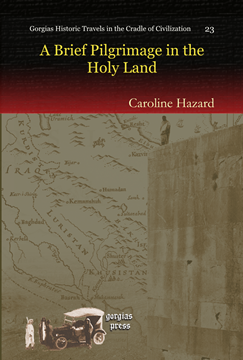Wort und Wahrheit
Revue for Religion and Culture. Supplementary Issue Number 1. First non-official Ecumenical Consultation between Theologians of the Oriental Orthodox Churches and the Roman Catholic Church. Vienna-Lainz September 7-12 1971
Translated by Maurice Khuri Taraqji; Introduction by Gregorios Yohanna Ibrahim
ISBN: 978-1-60724-261-1
This is a translation into Arabic of Wort und Wahrheit: Revue for Religion and Culture, Supplementary Issue Number 1, which contained the papers and minutes of the first non-official ecumenical consultation between Oriental Orthodox and Roman Catholic theologians, sponsored by Pro Oriente, the ecumenical foundation. This volume contains a number of papers by Oriental Orthodox and Roman Catholic theologians relating to Christology, Monophysitism and Dyophysitism, and the acceptance of the Council of Chalcedon.
$198.00 (USD) $118.80 (USD)
Arabic-Syriac Dictionary
By Mikhael Murad; Edited by Gregorios Yohanna Ibrahim
ISBN: 978-1-60724-262-8
This book is a reprint of Murad’s Arabic-Syriac dictionary, the first such dictionary ever composed, and the only work of the author. The present volume extends from the letter alif to the beginning of the letter sin; the second half of the dictionary has unfortunately been lost. For each Arabic word given, a number of Syriac equivalents are recorded. The dictionary also gives Syriac equivalents to Arabic idioms.
$270.00 (USD) $162.00 (USD)
Accepting the Other
ISBN: 978-1-60724-263-5
Written by the eminent Syrian Orthodox Metropolitan of Aleppo, Accepting the Other, offers an eloquent and alternative perspective to the question of religious co-existence and the so-called ‘Clash of Civilizations.’ Bishop Gregorios’ book begins with an historical overview of the presence of Christians in the Middle East and their rich cultural contributions to the region, stretching back to the days of the Roman Empire and discusses the Islamic conquests and the Crusades from the little-heard yet extremely important Middle Eastern Christian perspective; he also offers examples of Christian-Muslim co-existence and discusses the question of citizenship.
$169.00 (USD) $101.40 (USD)
Syrian Orthodox Music
ISBN: 978-1-60724-264-2
This book originated in Bishop Yohanna Gregorios’ dissatisfaction with the lack of a study which would show where the music of the Syrian church came from, how it was accepted in the church, the basis on which it entered the church, the regional variation in chanting traditions, and the development of church music through time.
$127.00 (USD) $76.20 (USD)
the Vienna Dialogue
Five Pro Oriente Consultations with Oriental Orthodoxy. Communiqués and Joint Documents. Booklet Nr. 1
Translated by Michel Azraq; Edited by Gregorios Yohanna Ibrahim
ISBN: 978-1-60724-265-9
This book is a translation into Arabic of The Vienna dialogue: Five Pro Oriente consulations with oriental Orthodoxy: communiqés and common declarations, edited by Rudolf Kirchschläger and Alfred Stirnemann (Horn, Austria, 1991); it contains a number of documents written by both Roman Catholic and Oriental Orthodox churchmen connected to the question of the relationship between these churches.
$134.00 (USD) $80.40 (USD)
The Vienna Dialogue
Five Pro Oriente Consultations with Oriental Orthodoxy. The Vienna Dialogue. Middle East Regional Symposium. Deir Amba Bishoy. Booklet Nr. 3
Translated by Awdit Nasif; Edited by Gregorios Yohanna Ibrahim
ISBN: 978-1-60724-266-6
This book is a translation into Arabic of The Vienna Dialogue: five Pro Oriente consultations with Oriental Orthodoxy/ Middle East Regional Symposium, Deir Amba Bishoy, October 1991 (Vienna, 1991) and contains a number of articles by Roman Catholic and Oriental Orthodox churchmen connected to the question of the relationship between these churches.
$141.00 (USD) $84.60 (USD)
The Vienna Dialogue
Five Pro Oriente Consultations with Oriental Orthodoxy On Councils and Conciliarity. Second Study Seminar. June 1992. Booklet Nr. 5
Translated by Marcel Taraqji; Edited by Gregorios Yohanna Ibrahim
ISBN: 978-1-60724-267-3
This is a translation into Arabic of The Vienna Dialogue: Five Pro Oriente Consultations with Oriental Orthodoxy On Councils and Conciliarity. Second Study Seminar. June 1992. Booklet No. 5 (Vienna 1993) and contains documents and communications from both Roman Catholic and Oriental Orthodox perspectives on questions relating to church councils.
$120.00 (USD) $72.00 (USD)
The Vienna Dialogue
Five Pro Oriente Consultations with Oriental Orthodoxy On Primacy. First Study Seminar. June 1991. Booklet Nr. 4
Translated by Marcel Taraqji; Edited by Gregorios Yohanna Ibrahim
ISBN: 978-1-60724-268-0
This is a translation into Arabic of The Vienna Dialogue: Five Pro Oriente Consultations with Oriental Orthodoxy On Primacy. First Study Seminar. June 1991. Booklet nr. 4 (Vienna, 1991) and contains documents from the discussions which took place in Vienna in June 1991 relating to the question of Papal Primacy and the various Oriental Orthodox Churches.
$129.00 (USD) $77.40 (USD)
The Kingdom of God in the Writings of the Fathers
Series: Analecta Gorgiana 177
ISBN: 978-1-60724-269-7
Exploring the concept of the kingdom of God, this thesis is based on Patristic sources from the time of Clement of Rome to that of John of Damascus. Herrick begins with the Apostolic Fathers to set the stage for the major divisions that follow. Divided into the Ante-Nicene Fathers and the Nicene and Post-Nicene Fathers, the sources are divided into the Greek and Latin traditions and the major theologians and historic sources are examined for what they indicate about the theme. Written in non-technical language, this volume is readable by laity and specialists alike.
$58.00 (USD) $34.80 (USD)
A Brief Pilgrimage in the Holy Land
Series: Kiraz Historic Travels Archive 23
ISBN: 978-1-60724-270-3
This series of addresses constitute a unique travelogue from a renowned author and traveler Caroline Hazard. In addition to her ability as a travel writer, Hazard was also an artist and poet. Her talents in this regard are clear to readers of this little book. Paintings and photographs from her journey to the Holy Land are interspersed with her account of her travels and sonnets that provide the ambiance of the experience for her readers. Unconventional as a travel journal in its anecdotal narration of her impressions, the overall feel of the book is an experience for any armchair adventurer.
$127.00 (USD) $76.20 (USD)
